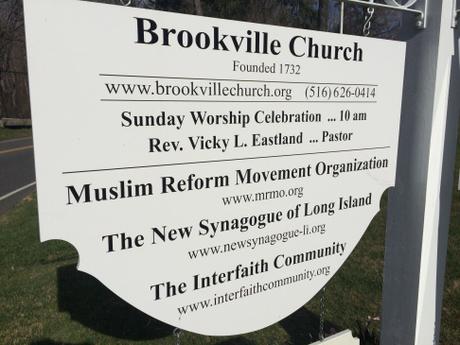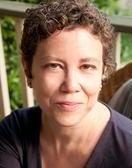
Photo: Susan Katz Miller
While reporting my recent article in The Washington Post on Brookville’s Multifaith Campus on Long Island, I ended up with a lot of material that did not make it into the story. As an unofficial historian of the interfaith family communities movement, one of my goals is to record and preserve as much of our ongoing story as possible. Below, I share an extended interview with the minister at Brookville Church, Reverend Vicky Eastland. Here, she discusses her role as a Reformed Church in America minister, in the context of Brookville’s Multifaith Campus—a joint project of the Brookville Church, The New Synagogue of Long Island, the Muslim Reformed Movement Organization, and the Interfaith Family Community of Long Island.
Susan Katz Miller (SKM): When the search committee first contacted you about coming to Brookville as the new pastor, the Interfaith Community already had a close relationship with the church there. What was your first impression of this relationship?
Rev. Vicky Eastland (VE): Initially, one of the reasons Brookville was interested in me was because I was one of the founding members of an interfaith council in upstate New York where I was pastoring a church at the time: we met to do community service and events together. When I heard the word interfaith, that’s what I thought of. It wasn’t until I received a series of questions the church wanted me to answer on paper that I realized it was about interfaith families. I still had no idea what this interfaith families community was, that was connected to the church.
SKM: I know Pam Gawley (co-founder with Sarah Cirker of the Interfaith Community of Long Island) has said she may be the only Jewish woman to serve on a church search committee for a new pastor.
VE: When I showed up for my second interview, I was really quite surprised because the search team of the church stepped aside and let Pam and Sarah lead the interview. It ended up being a great experience for all of us. I remember one of the search team members saying something that has stayed with me: “We’re not just looking for the next pastor, we’re looking for someone to take us further in our relationship with the Interfaith Community.” This was an integral part of helping them decide who the next pastor would be.
SKM: The Interfaith Community of Long Island, which was founded to support Jewish and Christian interfaith families, now holds their interfaith Sunday School at Brookville, and these interfaith families attend the church service at Brookville on a specific Sunday each month, as part of their interfaith education program. Do the theological differences between Judaism and Christianity pose a challenge for you in those services?
VE: The most challenging aspect for me since I’ve been at Brookville is surrounding the Sacrament of Communion. Personally, I don’t think we should turn anyone away from an experience with God, so I understand opening the communion table to non-Christians. But the wording in the Reformed Church in America (RCA) liturgy is very Christocentric. I was using that liturgy, and I had a Catholic woman ask me, “Can you please not use those words? My husband who is Jewish feels like all Christians are blaming him for the crucifixion of Christ.” There were Sundays when I left the service, and I started crying because I felt like something I said was offensive to someone from IFC. But then there was pushback from other Christians who were saying, “We don’t want you to take those words out.” But for a while I did, because I don’t think anything should be excluding people who want to be there.
In my second year, we moved IFC Sunday to a non-communion Sunday, and I’ve gone back to the RCA language for communion. Pam Gawley, who is Jewish, told me, “We want this to be authentically Christian.” We’re all on this journey together. And the Catholic woman who was worried about how her Jewish husband feels? That husband actually participates now in communion.
Last Sunday was Easter Sunday. I was very Christocentric in my sermon–but its hard not to be on Resurrection Sunday. That cognitive dissonance that I had in the first year, I don’t have so much anymore. In the service I said, “I know there are people who are with us today that aren’t Christian, and don’t believe what we’re saying here, and that’s okay.” A Jewish mom came up to me afterwards in tears, and said she was so moved to be acknowledged. It was not planned: it just came out of me.
SKM: I know the Muslim study group had been meeting at Brookville Church on Sunday afternoons for many years, but how did it become integrated into the Multifaith Campus?
VE: When I got there in the fall of 2013, I realized the rabbi, Rabbi Stuart Paris, had never met the Muslim leader, Dr. Sultan Abdulhameed. I started doing introductions, friendships formed, and we realized our individual missions were so similar–we all wanted to bring reform to our specific faiths. None of our groups is exclusive, anyone is welcome at any of the groups. Then we said let’s do something together, around a holiday not based on any of our faiths.
That first Thanksgiving together was the highlight of my entire ministry career. We started out with our new Brookville Multifaith Campus sign dedication, on the lawn of the church. One of the members from the Muslim community did the call to prayer in Arabic outside on the PA system. We had about 200 people, the maximum we can fit into the chapel, and there wasn’t a dry eye. Dr. Sultan said he’d been to a lot of these interfaith Thanksgiving services where the representatives each preach from their own holy scripture, and it feels almost like a competitive situation. So he suggested that instead we preach from each other’s holy scriptures. I ended up preaching from the Quran, Dr Sultan from the Torah, and Rabbi Stuart from the New Testament. That’s what we’ve done ever since—this year was our third Thanksgiving together.
Since that first Thanksgiving, I have traveled to the Sultanate of Oman, a Muslim majority nation in the Middle East , and I have had a lot more exposure to the Muslim faith. The Quran has come alive to me in ways I never would have imagined. We’ve been talking with the IFC about how to add an Islamic unit to the interfaith Sunday School curriculum. For now, we’ve decided to wait until there are more young Muslim interfaith families in the IFC community.
SKM: As the Brookville Multifaith Campus becomes established, do you see this as a template for other communities?
VE: We’re now at the point where I’m starting to form a team with people from members of all four communities, to work on becoming a 501c3 (non-profit institution). The long-range hope is that that this will turn into a model that will change the makeup of our church. I believe that’s the direction all houses of faith should move in. I think it’s a model that everyone should look at.
Many churches, here and across the country, have been shrinking, even closing. Recently, I met with a group of clergy from Long Island. They came to learn about what we’re doing–how it’s working, why it’s working, and what we’re doing that’s making it so successful. We all need to wake up and realize that we’re becoming a more integrated society. How is that going to play out in our houses of faith? Clergy can no longer bury their heads in the sand and pretend that the needs of interfaith families are not important. We have to find ways to meet their spiritual needs. Ours is a model that others can follow.
Susan Katz Miller is the author of Being Both: Embracing Two Religions in One Interfaith Family, from Beacon Press. She works as an interfaith families consultant, speaker, and coach. Follow her on twitter @beingboth.

